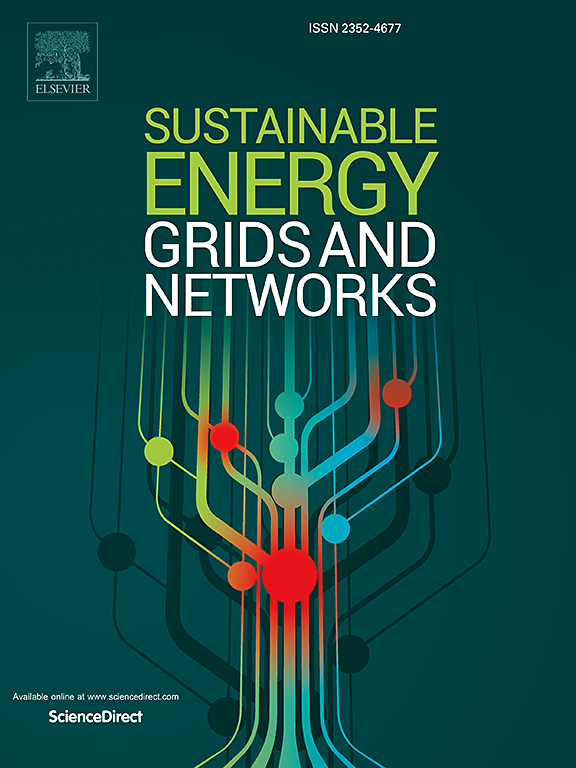Expansion planning via decomposition to achieve fully renewable power and freshwater systems
IF 4.8
2区 工程技术
Q2 ENERGY & FUELS
引用次数: 0
Abstract
As the reliance on electricity for producing freshwater continues to grow, the development of an expansion planning model that captures the interdependency between power and freshwater systems becomes increasingly important. This paper proposes a two-stage stochastic expansion planning model that represents the interdependence of these systems and accounts for the uncertainties involved. The first stage represents investments for achieving fully renewable power and freshwater systems, while the subsequent stage represents the operation of both systems. The model accounts for both long-term uncertainties, which pertain to growth in power and freshwater demands, and short-term uncertainties, which pertain to the daily fluctuations in freshwater and power demands as well as in renewable production. Due to the complexity of representing the operation of both systems under numerous operating conditions, expansion planning models often become computationally burdensome. To reduce the computational burden, we propose an effective partitioning technique that relies on Benders’ decomposition, dividing the expansion planning problem into a sufficiently small master problem and numerous subproblems. To enhance convergence, we incorporate the operation constraints pertaining to the worst operating condition into the master problem. Numerical experiments underscore the efficacy of utilizing the proposed technique to solve the expansion planning of large-scale systems.
通过分解扩展规划,实现完全可再生能源和淡水系统
随着对电力生产淡水的依赖程度不断增加,开发一种能够反映电力和淡水系统之间相互依存关系的扩建规划模型变得越来越重要。本文提出了一个两阶段随机扩展规划模型,该模型体现了这些系统之间的相互依存关系,并考虑了其中的不确定性。第一阶段表示为实现完全可再生的电力和淡水系统而进行的投资,而随后的阶段则表示这两个系统的运行。该模型既考虑了与电力和淡水需求增长有关的长期不确定性,也考虑了与淡水和电力需求以及可再生能源产量的日常波动有关的短期不确定性。由于这两个系统在多种运行条件下的运行情况非常复杂,扩建规划模型的计算负担往往很重。为了减轻计算负担,我们提出了一种有效的分区技术,该技术依赖于本德斯分解,将扩展规划问题划分为一个足够小的主问题和众多子问题。为了提高收敛性,我们在主问题中加入了与最差运行条件相关的操作约束。数值实验证明了利用所提技术解决大规模系统扩展规划问题的有效性。
本文章由计算机程序翻译,如有差异,请以英文原文为准。
求助全文
约1分钟内获得全文
求助全文
来源期刊

Sustainable Energy Grids & Networks
Energy-Energy Engineering and Power Technology
CiteScore
7.90
自引率
13.00%
发文量
206
审稿时长
49 days
期刊介绍:
Sustainable Energy, Grids and Networks (SEGAN)is an international peer-reviewed publication for theoretical and applied research dealing with energy, information grids and power networks, including smart grids from super to micro grid scales. SEGAN welcomes papers describing fundamental advances in mathematical, statistical or computational methods with application to power and energy systems, as well as papers on applications, computation and modeling in the areas of electrical and energy systems with coupled information and communication technologies.
 求助内容:
求助内容: 应助结果提醒方式:
应助结果提醒方式:


